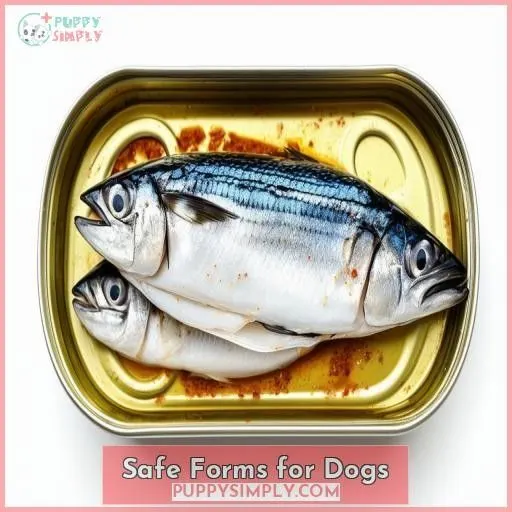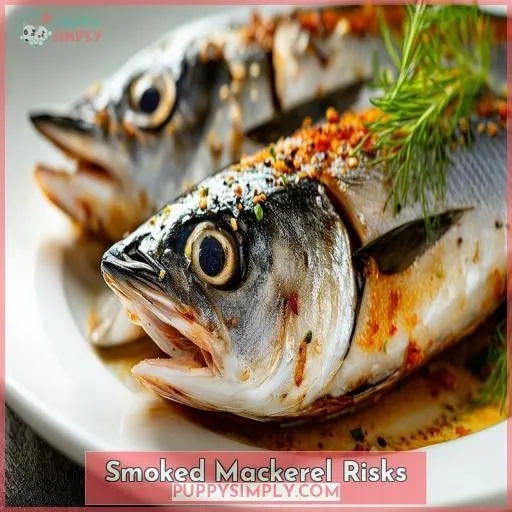This site is supported by our readers. We may earn a commission, at no cost to you, if you purchase through links.
 You can feed your dog canned mackerel, but with caution.
You can feed your dog canned mackerel, but with caution.
While it provides protein and omega-3s, canned varieties are less nutritious than fresh.
Check for unhealthy additives like salt, oils, and MSG.
Avoid flavored options with spices that could upset your pup’s stomach.
For safer feeding, opt for fresh, frozen, or plain cooked mackerel.
Portion sizes matter too – overindulging can lead to issues like pancreatitis.
To learn the smartest ways to incorporate this fishy treat into your dog’s diet, you’ll want to dive deeper.
Table Of Contents
Key Takeaways
- Fresh is best when it comes to feeding your pup mackerel. Canned varieties often contain unhealthy additives like salt, oils, and seasonings that can upset your dog’s tummy. It’s like serving them a hearty fish stew loaded with spices – their delicate digestive systems might not be ready for that flavor explosion!
- Portion control is key with mackerel, whether it’s fresh or canned. Overindulging can lead to pancreatitis, which is like your pup’s pancreas throwing a tantrum. Nobody wants that! A few bite-sized chunks as an occasional treat should keep everyone happy and healthy.
- When it comes to canned mackerel, always read the label like a detective scrutinizing clues. Avoid any sketchy ingredients like MSG, tomato sauce, or sunflower oil that could potentially harm your furry friend. Their safety should always come first, even if it means passing on that flashy-labeled can.
- While canned mackerel can be a convenient option, it’s generally less nutritious than fresh or frozen. It’s like choosing between a homemade meal and fast food – one is clearly the better choice for your pup’s overall well-being. So whenever possible, opt for the fresh stuff and treat your doggo to the real deal.
Can Dogs Eat Canned Mackerel?
Yes, dogs can eat canned mackerel in moderation, but it’s generally safer to feed them fresh, cooked, or frozen mackerel without added sauces or seasonings. Canned mackerel may contain unhealthy additives, high levels of sodium, and potential irritants that could pose risks to your dog’s health.
Nutritional Benefits
Mackerel offers an excellent protein source for dogs and is rich in essential vitamins like B12 and D, as well as beneficial omega-3 fatty acids that support growth, development, and brain function. When considering canned mackerel as a nutritional option for your canine companion, it’s important to evaluate the potential benefits against any risks or drawbacks.
Excellent Protein Source
Mackerel is an excellent protein source for your pup. It’s easily digestible and packed with healthy nutrients like omega-3 fatty acids – great for your furry friend’s coat and skin. Just be mindful of potential allergies and feed appropriate portion sizes, stored properly. Consider supplementing with mackerel oil for an extra omega-3 boost.
Rich in Vitamins
In addition to being a superb source of protein, mackerel is also replete with essential vitamins such as B12 and D. These vitamins contribute to your pup’s gut health, offer antioxidant benefits, and bolster their immune system. However, canned and smoked mackerel may have fewer vitamins compared to fresh or frozen options.
Omega-3 Fatty Acids
You’ll be pleased to know that mackerel is rich in omega-3 fatty acids, which offer numerous benefits for your pup. These healthy fats:
- Support heart health and cognitive function
- Provide anti-inflammatory properties
- Promote a shiny coat and healthy skin
- Aid in brain and eye development
Mackerel oil contains high levels of EPA and DHA, two essential omega-3s your furry friend needs.
Supports Growth and Development
| Benefit | Description |
|---|---|
| Protein | Builds and repairs tissues during growth spurts. |
| Omega-3s | Aid brain development and cognitive function. |
| Vitamin B12 | Essential for puppies’ energy metabolism. |
| Vitamin D | Promotes healthy bone growth and development. |
Puppies especially need mackerel’s nutrients for proper physical and mental development. Just avoid unhealthy additives like spices or Tomato Sauce.
Safe Forms for Dogs
You can safely feed your dog fresh, frozen, boiled, or baked mackerel, but boneless fillets are the safest option. When preparing mackerel for your furry friend, avoid sauces or oils that may contain unhealthy additives like salt, sugar, or spices.
Fresh Mackerel
Fresh mackerel is an excellent choice for dogs! Enjoy its:
- Rich omega-3 content for coat health
- Natural source of vitamins and minerals
- Low allergen risk compared to other fish
- Easily digestible protein for energy
- Soft, edible bones for added nutrition
Just be mindful of proper portion sizes and remove any bones that may pose a choking hazard. Your pup will thank you for this tasty, nutritious treat!
Frozen Mackerel
Frozen mackerel is another safe option for your pup. The freezing process locks in nutrients, so you’ll be providing a protein-packed treat. Store frozen fillets properly to prevent freezer burn, then defrost safely before serving in appropriate portion sizes. Be sure to remove any bones for a worry-free mealtime.
Boiled Mackerel
Boiling mackerel is another safe option if you’re looking to feed your pup this nutritious fish. Just be wary of any fish stock or head oils that may contain harmful components. Boiling removes some skin benefits, but eliminates risks of bone fragments and parasites found in raw fish.
Baked Mackerel
Baking mackerel removes potential parasites and makes it safer for your pup. Remove bones and skin before baking at 350°F for 15-20 minutes. Let it cool completely, then shred into bite-sized portions. Baked mackerel is a healthy occasional treat, but limit portions to avoid excess fats and calories.
Boneless Fillets
For the safest and most convenient option, boneless mackerel fillets are a great choice. They’re easy to digest, affordable, and free of potential hazards like bones or skin. With fillets, you can rest assured your pup is enjoying the nutritional benefits of mackerel without any unnecessary risks.
Mackerel in Sauces
When preparing mackerel for your dog, you’ll want to avoid using tomato sauce, as it often contains added salt and sugar that can be harmful. Likewise, sunflower oil should be avoided due to its high fat content and potential toxicity.
Olive Oil
You can safely feed your dog mackerel cooked in olive oil in small amounts. Olive oil offers:
- Healthy fats
- Vitamins E and K
- Antioxidants
- Anti-inflammatory properties
However, moderation is key, as too much oil can lead to pancreatitis or obesity in dogs. Consider substituting olive oil with low-sodium broth for a healthier alternative.
Avoid Tomato Sauce
You’ll want to avoid feeding your pup mackerel in tomato sauce due to the added salt and sugar content. These ingredients can lead to dehydration and other health issues for dogs. Stick to plain, unseasoned mackerel or opt for baked or boiled preparations without added sauces or seasonings for a safer, healthier option.
Avoid Sunflower Oil
You’ll want to avoid sunflower oil when adding sauces to your dog’s mackerel. Sunflower oil is high in fat and can potentially cause:
- Pancreatitis
- Obesity
- Gastrointestinal issues
- Toxicity
Instead, opt for safer alternatives like olive oil in moderation or plain, unsauced mackerel.
Smoked Mackerel Risks
Smoked mackerel often contains high levels of salt, which can lead to dehydration and other health issues in dogs. Additionally, the smoking process may introduce potential irritants, like spices or black pepper, that could cause digestive problems or even poisoning if consumed in large quantities.
High Salt Content
You’ll want to steer clear of smoked mackerel due to its high sodium content. Too much salt can lead to salt poisoning and dehydration, causing digestive upset and urinary issues in dogs. Play it safe by avoiding smoked varieties entirely and sticking with fresh or frozen mackerel instead.
Potential Irritants
You’ll want to steer clear of smoked mackerel due to potential irritants like spices and black pepper. These can upset your pup’s stomach, leading to discomfort or even poisoning. Plus, the smoking process adds unhealthy additives that dogs don’t need in their diet. It’s best to avoid smoked varieties altogether and stick to fresh or frozen mackerel instead.
Dehydration Risk
Smoked mackerel’s high salt content can also cause dehydration in dogs. You’ll want to watch for:
- Excessive panting and thirst
- Dry nose and mouth
- Lethargy and loss of appetite
If your dog seems dehydrated after eating smoked mackerel, give them water and contact your vet. It’s best to prevent dehydration by avoiding smoked fish altogether.
Poisoning Risk
In addition to dehydrating your pup, smoked mackerel also poses a poisoning risk. The salt and spices used in smoking can be toxic if ingested in large quantities. You don’t want your furry friend experiencing vomiting, diarrhea, or even worse effects from consuming too much smoked fish. It’s best to avoid feeding your dog smoked mackerel altogether.
Canned Mackerel Considerations
Canned mackerel can be a convenient option for feeding your dog, but it’s generally less nutritious than fresh or frozen varieties. Be sure to check the label for any unhealthy additives like excessive salt, oils, or spices, and avoid flavored varieties, especially those with curry or other strong seasonings that could upset your dog’s digestion.
Less Beneficial Than Fresh
While canned mackerel offers conveniences, it’s generally less nutritious than fresh or frozen. The canning process uses preservatives and heat that can diminish beneficial nutrients and omega-3s. Plus, canned varieties may contain fillers, flavorings or brines that aren’t ideal for dogs’ diets. For superior nourishment, fresh mackerel trumps canned options.
Check for Unhealthy Additives
You’ll want to carefully check canned mackerel labels for unhealthy additives that could harm your pup. Preservatives may cause digestive issues, excess salt leads to dehydration, certain oils risk toxicity, and MSG has been linked to seizures in dogs. Steering clear of these additives reduces risks like allergic reactions or other health concerns.
Avoid Flavored Varieties
Regarding canned mackerel, steer clear of flavored varieties. These frequently contain added salts, sugars, and preservatives that can be unhealthy for your furry companion. Stick to simple, unseasoned options to reduce the risk of digestive upset or adverse reactions from unfamiliar ingredients. By keeping it unadorned, you’ll make sure your pup gets the nutritional benefits without any unnecessary additives.
Avoid Curry and Spicy Flavors
You’ll also want to avoid curry and spicy flavored canned mackerel. Dogs often have sensitivities to intense flavors, which can lead to allergies, stomach upset, and digestion issues. If your pup is a picky eater, strong flavors may turn them off their meal entirely. Stick to plain, unflavored varieties for a safer dining experience.
Frequently Asked Questions (FAQs)
How much canned mackerel is safe to feed?
Over 25% of dog owners feed canned fish – moderation is key. A 3 oz portion weekly for a medium breed is safe if unsalted, boneless, and oil/sauce-free. Monitor sodium intake to avoid dehydration.
Can puppies eat canned mackerel safely?
While canned mackerel is safe in moderation for adult dogs, puppies should avoid it. The high salt content, spices, and potential toxins can upset their delicate digestive systems. Stick to fresh or frozen fish until your pup reaches maturity.
How often can dogs eat canned mackerel?
Like a ship’s rations, canned mackerel offers nutrition but requires moderation. You can safely feed your pup a small portion once or twice weekly as a savory treat, but fresh fish is the better catch for regular meals.
Are there specific canned mackerel brands to avoid?
When buying canned mackerel for your pup, avoid brands with excessive salt, spices like black pepper, or flavored sauces. Always check the ingredients list and opt for plain, unseasoned varieties.
What are signs of mackerel allergy in dogs?
Signs of mackerel allergy in dogs include vomiting, diarrhea, itchy skin, and excessive paw licking. If you notice these symptoms after feeding mackerel, stop immediately and consult your vet.
Conclusion
Like traversing uncharted waters, introducing canned mackerel to your dog’s diet requires caution.
While it offers protein and omega-3s, you’ll want to avoid unhealthy additives and stick to plain, cooked varieties.
Portion sizes matter too – overindulging can lead to pancreatitis.











